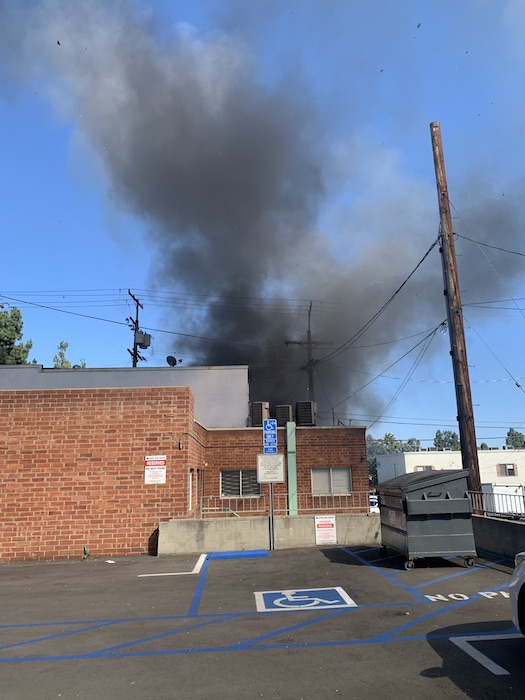
In today’s blog, I go over the importance of your computer safety from fires. Now, what about you? What protection do you have for yourself?
Recently at one of our corporate clients. I have expressed to them the importance of backing up their data, not only locally but cloud-based backup in case of a disaster.
Later that day while working in their back office we saw smoke outside the window, from the building next door. One of the ladies in the office said it was a restaurant and they have a new cook. I told her that wasn’t bad cooking, the place is on fire! Luckily the Burbank Fire Dept. (BFD) was around the corner, and it didn’t take long for the Fire & Police Dept. to evacuate the area, including our building.
The fire was quickly under control by the BFD and my client did get an up close and personal reason why backups are so important.
Here are some helpful protection tips 👍🏼
Backup and Cloud Storage: Regularly back up your computer to an external hard drive for Time Machine backups. And use cloud-based backups as well. This way, even if your computer is damaged or destroyed in a fire, you can still access your data from a secondary location. We use and promote using Backblaze (see the bottom of this page for details).
Surge Protectors: Use surge protectors or Uninterruptible Power Supply (UPS) systems to safeguard your computer against power surges and electrical fires. Surge protectors help prevent damage caused by power fluctuations, while UPS systems offer additional battery backup to keep your computer running during power outages.
Don’t overload electrical outlets: Plugging too many devices into one outlet can overload it and increase the risk of a fire.
Adequate Ventilation: Ensure that your computer and its components have proper ventilation to prevent overheating.
Unattended Operation: Avoid leaving your computer unattended for long periods, especially if it’s powered on. Power it down or place it in sleep mode when not in use to reduce the risk of fires caused by electrical faults or overheating.
Regular Maintenance: Have us perform regular maintenance on your computer, such as cleaning dust from fans and components for proper ventilation to keep the computer running cool.
Remember, these measures can significantly reduce the risk of fire damage to your computer, but they cannot guarantee absolute protection. It’s always important to have appropriate insurance coverage and take additional precautions based on your specific circumstances.
If you need help with proper backup solutions please contact us.
MacMyDay
macmyday
Macmyday
And what about you?

In today’s blog, I go over the importance of your computer safety from fires. Now, what about you? What protection do you have for yourself?
Recently, my mother-in-law was at home, while cooking a baked potato in a very old microwave, and the potato caught on fire. Luckily she responded quickly before the fire destroyed the microwave and then the house.
When the smoke hit the fire sensor (part of her home security system we had installed), They called her immediately and asked if she needed the Fire Dept. She told them that it was only the potato that caught fire and that she was ok.
She called me and informed me of what happened. I told her “She got very lucky”. I also realized she didn’t have a fire extinguisher in the kitchen. So, I took her out and we got not only a new microwave with safety sensors but also a fire extinguisher. But, she then wanted to hide the extinguisher under the sink, inside the cabinet. I expressed to her “Out of sight is out of mind, and with a fire seconds count”. I placed the extinguisher on the counter for easy access and showed her how to use it.
After this lil adventure, I wanted to write this to put the word out about our own protection
More personal protection tips:
Protecting your home from fires is essential for the safety of your family and property. Here are some measures you can take to enhance home protection from fires:
- Install smoke detectors: Place smoke detectors on every level of your home, including inside and outside sleeping areas. Test them regularly and replace batteries as needed.
- Have fire extinguishers: Keep fire extinguishers in easily accessible areas, such as the kitchen and garage. Learn how to use them properly and teach your family members as well.
- Develop an evacuation plan: Create a detailed escape plan that includes multiple routes from each room. Practice the plan regularly with all family members, especially children, so everyone knows what to do in case of a fire.
- Clear potential fire hazards: Keep flammable items such as curtains, furniture, and paper away from heat sources. Maintain clear space around heaters, stoves, and electrical panels.
- Be cautious with open flames: Keep a close eye on open flames, including candles, stoves, fireplaces, and BBQs. Never leave them unattended, and ensure they are fully extinguished before leaving them.
- Practice kitchen safety: The kitchen is a common area for fires. Never leave cooking unattended and keep flammable items away from the stove. Keep a lid nearby to smother small grease fires.
- Stay informed: Stay updated on fire safety practices and educate your family about fire prevention. Teach children about the dangers of fire and how to respond in case of an emergency.
Remember, fire safety is a shared responsibility, and it’s crucial to involve everyone in your household (our other family members not living with you) in fire prevention and preparedness efforts.
And don’t forget to stay hydrated in this crazy heat!
– Tommy